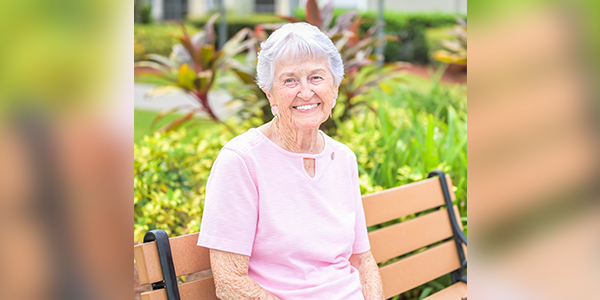You are at: Planned Giving > Gift Options > Donor Stories
HARRIET D. '56 AND GEORGE D. '58* HALL

Love Story to Legacy
By Sara Karnish
As a young coed studying elementary education at State Teachers College at East Stroudsburg, Harriet Davis would often stop by Kemp Library to study or read between classes. She was in the library often enough to notice a young man who always seemed to be there at the same time.
"He would read The New York Times, which I thought was very impressive. I started talking to him," Harriet recalls. Gradually, their talks moved out of the library to a tearoom across from campus called Rosie's. Soon they were dating exclusively. The young man's name was George D. Hall. Born in Newark, N.J, George delayed attending college to complete his military service. A proud U.S. Marine Corps veteran, George was an education major at ESU.
"He was a veteran, but attending classes while I was teaching in the Walt Disney Elementary School in Tullytown, Pa.," Harriet explained. She was not shy about asking George his intentions. "This was in 1959. He graduated and was already teaching. I came out and asked him if we were planning a future together. He thought about it and said, 'I guess we are.' We went from being friends to possible husband and wife." They were married in 1960. Their 60-year marriage was "a good partnership," Hall recalls, one built on similar values and beliefs and a shared love of education and travel.
"Whatever we embarked upon, it really worked," she said.
Born in Steubenville, Ohio, in 1934, Harriet originally planned to be a librarian; instead, she followed her mother's example and studied elementary education, first at Ohio State and later at East Stroudsburg from where she graduated in 1956.
"Mother had been a teacher but gave it up when she married my father in 1929. At this time the Depression was in full bloom," Harriet said. "She was always talking about her experiences as a teacher in a coal mining town in southern Ohio. She was a great inspiration as to why I became a teacher. Also, in the 1950s, we didn't have the choices kids have today. It was very limited—women were either nurses, secretaries, teachers, or homemakers. It was ordained I was going to be one of those. When I found my niche, it was the right one."
Harriet came from a working-class family. Her steelworker father found a better-paying job in a steel mill in Fairless Hills, Pa., and the family relocated. Harriet stayed in Ohio but missed her family desperately. She considered transferring to a school in Pennsylvania and discovered State Teachers College at East Stroudsburg, now East Stroudsburg University—one of 14 state schools at the time.
"Something about ESU just popped out at me. I don't know if it was because it was a small campus, or in a small town in the Poconos, but I applied and I was accepted." She recalls, "I became an individual at ESU. At Ohio State, there were 3,000 students at orientation. I never felt like I was part of the larger picture. At ESU, I felt like I was a person and belonged there. The whole place was family-like—the professors knew you and cared about you. As a result, I was very happy there."
One special teacher in the elementary education program was Mrs. Pauline Petersen, said Harriet.
"She was a supportive mentor during my undergrad days and did much to guide in my teaching career after graduating from Rutgers University with a master's degree in curriculum and supervision." Harriet then became a New Jersey Helping Teacher assigned to Warren County's superintendent of schools where she worked directly with teachers in the more rural schools.
ESU always held a special place for the couple. "It has always been our feeling—there is a strong attachment to ESU. We never lost that connection," Harriet said.
George earned degrees in education from ESU in 1958 and Rutgers University. Later, the Halls moved to Connecticut and embarked on long and rewarding careers as educators. George was an educator for 31 years, serving as a middle school social studies teacher, teaching principal at an elementary school, and, along with Harriet, emeritus associate professor of education and educational psychology at Western Connecticut State University. Harriet was a supervisor as well as teacher.
Proud as he was of his career in education, George was even prouder of his military service during the Korean War.
"He was a great fellow, a quiet person, and very much a Marine. He believed in the value of the Marine Corps, and he practiced them his whole life," Harriet said. "I couldn't imagine him doing anything unethical—they were the values the Marines taught him. He was not a demonstrative person, but cool and capable."
The Halls had no biological children—their "children" were the thousands of students they taught and mentored.
"I had my life as a supervisor and teacher, he had his life. We did our work together as teachers. We were very, very conservative people and started investing in 1982. We didn't need a mansion or a great deal of money, and if he was like that, I don't think our marriage would've worked," Harriet admits. "We had no children, but we never felt badly about that. We were around children all the time. We found each other, decided it was a good match, and it was. I miss him every day."
The Halls retired from education in the late 1980s—George in 1989 and Harriet the following year. The single biggest change in the field? Technology.
"It was just coming in at the end of our professional life. It didn't impact our teaching the youngsters or preparing our youngsters for the classroom," Harriet recalled. "It was very traditional throughout both our careers—we had basic equipment like a projector. As soon as we left, schools started using things like email."
In 2020, George passed away suddenly at the age of 90, with Harriet by his side. Now as she looks ahead to her own 90th birthday next year, she is planning to throw herself a party. She has much to celebrate.
"I think 90 is a milestone. It allows me to look around at my friends, because life is so short, and I've seen so many wonderful people pass away. Losing George was so sudden and so traumatic, I couldn't believe it was happening," she said. "It's really important to be a good friend for as long as you have these people. I'm on a page where my attitude is, 'I'm Harriet. How are you?' People should be made to feel that someone cares, will give a smile and be glad to see them. That's what I'll do for as many years as I have."
George's passing forced her to take stock. She moved to a retirement community in Sun City Center, Fla., where she found a close circle of friends. Much of her time is spent on sewing projects for Dress a Girl Around the World (DAG), an initiative of the nonprofit organization Hope 4 Women International. DAG's volunteer groups sew dresses along with a Pocket Pal (a doll in a matching dress) for girls around the world.
"I don't know what I'd do with my time if I didn't have a purpose," she said, adding, "There has to be a reason for me to get up in the morning, and it's usually doing something for someone else. I have everything I need here where I live, so why not give back in some way, shape, or form, however you can?"
Losing George made Harriet think about their legacy.
"When George passed, I had to come to the hard realization that we had no children, so I had to find a good use of our money," she said. It seemed logical to contribute to ESU, where it all began for her and George. It is her wish that her recent bequest to the ESU Foundation, the result of the couple's years of careful investing, nurture the next generation of educators and help all ESU students reach their respective goals.
"I truly hope what we have planned will bear fruit," she said. "If our gift helps just a little bit, we couldn't ask for a greater legacy. I hope it will help students become better teachers and better citizens. The way the world is going, we need all those kids who are going to contribute something to the world."




